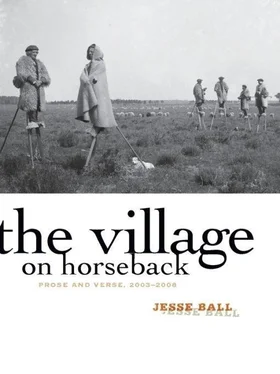Jesse Ball - The Village on Horseback - Prose and Verse, 2003-2008
Здесь есть возможность читать онлайн «Jesse Ball - The Village on Horseback - Prose and Verse, 2003-2008» весь текст электронной книги совершенно бесплатно (целиком полную версию без сокращений). В некоторых случаях можно слушать аудио, скачать через торрент в формате fb2 и присутствует краткое содержание. Год выпуска: 2011, Издательство: Milkweed Editions, Жанр: Современная проза, Поэзия, на английском языке. Описание произведения, (предисловие) а так же отзывы посетителей доступны на портале библиотеки ЛибКат.
- Название:The Village on Horseback: Prose and Verse, 2003-2008
- Автор:
- Издательство:Milkweed Editions
- Жанр:
- Год:2011
- ISBN:нет данных
- Рейтинг книги:5 / 5. Голосов: 1
-
Избранное:Добавить в избранное
- Отзывы:
-
Ваша оценка:
- 100
- 1
- 2
- 3
- 4
- 5
The Village on Horseback: Prose and Verse, 2003-2008: краткое содержание, описание и аннотация
Предлагаем к чтению аннотацию, описание, краткое содержание или предисловие (зависит от того, что написал сам автор книги «The Village on Horseback: Prose and Verse, 2003-2008»). Если вы не нашли необходимую информацию о книге — напишите в комментариях, мы постараемся отыскать её.
Samedi the Deafness
The Way Through Doors,
New Yorker’s
The Village on Horseback
The Village on Horseback: Prose and Verse, 2003-2008 — читать онлайн бесплатно полную книгу (весь текст) целиком
Ниже представлен текст книги, разбитый по страницам. Система сохранения места последней прочитанной страницы, позволяет с удобством читать онлайн бесплатно книгу «The Village on Horseback: Prose and Verse, 2003-2008», без необходимости каждый раз заново искать на чём Вы остановились. Поставьте закладку, и сможете в любой момент перейти на страницу, на которой закончили чтение.
Интервал:
Закладка:
No notion I had then, such as is in me now—
what it can mean to wake a thing that’s past.
Bestiary 16
Cardinal Piccate, famed priest-turned-skeptic of the 15th century:
we are somehow present at his denunciation. The pope
declares the excommunication to a crowd of hundreds
who have gathered in the papal gardens. A peculiar hand gesture
accompanies the statement. This gesture is much imitated
later that day and in the days to follow. Would that I could say
it was just the opening of a hand, or a gathering
of fingertips this way. No, you must observe it for yourself,
or read Cartoccio’s treatise on the matter. Later popes
resigned themselves to its loss as a tool of governance, so difficult
was it to master. But even now the sentence is being repeated.
Piccate, with his braided beard, his sun-scalded brow, is led off in chains.
Unbeknownst to the guards, you and I follow to his estate
on the hills outside Rome. He is put inside the main building,
with all his household and all its attendant creatures.
Hoisted above this building on scaffolding huge caul- drons tip
inevitably sealing the house in four-foot-thick
impenetrable hot wax. This was apparently
common practice. Skeptical thought must be dealt with
entirely or not at all, so says the Manual of Kings
and we who would rule must learn their fluid lessons.
To that end there is preserved, in a vault beneath the Vatican,
the house-entire of Cardinal Piccate, still sealed, hermetically,
poised in its last obdurate skepticism, caught beneath a lens
broad as a careful century.
The view from outside is stunning,
Cartoccio wrote, though it can in no way be compared
to that view achieved from the inaccessible interior.
Bestiary 17
A boundary. Laughter in the spanning rooms
I am forced to attend, one by one.
How attached they are, these unlikely places
one to another, street to gateway,
gateway to stair, stair to corridor
and from there — hidden rooms
and cluttered portals.
They say, I sang a song and you were in it
but you left just as I began. How I believe them.
It is a terribly hot summer
and from beneath this shading tree
there is a song just faintly, prompted
by my heel, each factored place singing out
when I have crossed some bordering veil.
But now I have my hearing,
and a group of men come into view,
walking with the theater, livelihood and jest.
Theirs was the tune I heard. Never to belong
to me, save in swayed refrain, or in the manner
of a berth laid by, as it was spoken to me
by the grand ship incidence, that said,
This is the tunnel through which the water flows
and I will bear you as water is borne: in a bucket, in a pan,
or loose throughout the drowning sea.
2 — Later Manual
Missive From a Room in Pau
A slightly pale tinge to the day,
as if even now it were being remembered.
Asking Advice of the Scissors, in their Small Drawer
By way of introduction, I use a soft white handkerchief
to polish the lens of my spyglass.
Afterwards we spy on your enemies.
Shall we attack them one by one
in the supposed safety of their beds?
Missive In a Room in Pau
A child on an invisible donkey demands your attention,
but you go right past him during an autumn day
one hundred years from now.
I appear at times
I appear at times to children when they go alone too long,
saying — sister, brother, how has it been with you? Dim forests,
balked women, these have sown signposts, not children
upon the broad aisles. For it is in belief that our progress
has long been halted. Tell me, what momentum stirs us
but truth and avoidance. Oh, long night’s approach
upon a warning. Long day, day all through afternoon
and the men who watch beneath the wooden shelters! I say
go to them, speak there, speak your fill. But then — how little
there is to say. I demand of you, the things you thought last night.
Tell us, you must tell us. You must tell us and grow old.
Missive In a Room in Pau
I saw you on that windy day when you were
as yet of no account, roaming the streets in a borrowed coat,
practicing the deft touch, the brief smile, and the slight collision
that are THE PICKPOCKET’s FEW FRIENDS.
Missive From a Room in Pau
The town was so small you could only glance at it out
the window of a moving train.
Here is some information about turtles:
The Corinthian Ambulant Turtle is named for its tripartite crown, a growth of horn to which scientists are troubled to ascribe utility. The Corinthian is the largest of the box turtles, being an incredible five feet in length, from tip of rear claw to sharp forebeak. It is noted for its dissimilarity to much of placid turtlekind. In nature it is perhaps closest to the brutal snapping turtles of North America, which are quite capable of snapping a small branch in two, particularly if that branch is being poked at them by an unctuous child. The Corinthian subsists upon a diet of Vruvkii nuts from the Vruvkii tree. These grow on the slopes of the Limbok Mountains east of the Urals. It is difficult to say whether it is the fault of the Vruvkii tree or the Corinthian Ambulant that neither have spread across foreign geographies. Certainly should one do so, the other would follow. The tree cannot spread, for its seed is carried within the nigh impenetrable Vruvkii nuts. And the turtle cannot spread, for on what would it subsist, were it to pass beyond its precious orchards of Vruvkii? In scientific tests, Russian researchers have managed to break the nuts, but it required the persistent use of a steam drill. Only the irresistible jaws of the Corinthian Ambulant Turtle can break the nut clean as by a whim and, digesting the tender nut, release the Vruvkii seed into the soil along with its own fecal matter. In terms of literary and historical significance, the Corinthian Ambulant has known both. Tolstoy’s Anna Karenina is menaced by one of these beasts while out picnicking as a child. And none other than the famous Rasputin was known to keep one at his side at all times. That turtle, nicknamed Levkar Klevar, meaning, Head Lost in the Clouds, can be seen in pictures from the period. Canning’s Momentary History of the Occident’s Orient includes a passage devoted purely to this marvelous beast:
It was with trepidation, then, that I stretched out my gloved hand to pet the thing. For had it not that same day snapped the Countess M.’s arm off at the elbow? The priest assured me there would be no repetition of such untowardity. I can report that its crown is quite hard. Were I not gloved I might have scratched the skin of my fingers on one of the many jagged edges that press forth. Though I cannot agree with Rasputin that it, rather than the lion, is king of beasts, I can say with some authority, it is certainly a king, though of what, I know not.
Inventions
Some having posited a lion, others must posit the lion having victims.
These victims in turn must posit things, things that are lost within the lion’s grim and enfolding city, that belly-land of growth and indolence.
Читать дальшеИнтервал:
Закладка:
Похожие книги на «The Village on Horseback: Prose and Verse, 2003-2008»
Представляем Вашему вниманию похожие книги на «The Village on Horseback: Prose and Verse, 2003-2008» списком для выбора. Мы отобрали схожую по названию и смыслу литературу в надежде предоставить читателям больше вариантов отыскать новые, интересные, ещё непрочитанные произведения.
Обсуждение, отзывы о книге «The Village on Horseback: Prose and Verse, 2003-2008» и просто собственные мнения читателей. Оставьте ваши комментарии, напишите, что Вы думаете о произведении, его смысле или главных героях. Укажите что конкретно понравилось, а что нет, и почему Вы так считаете.












